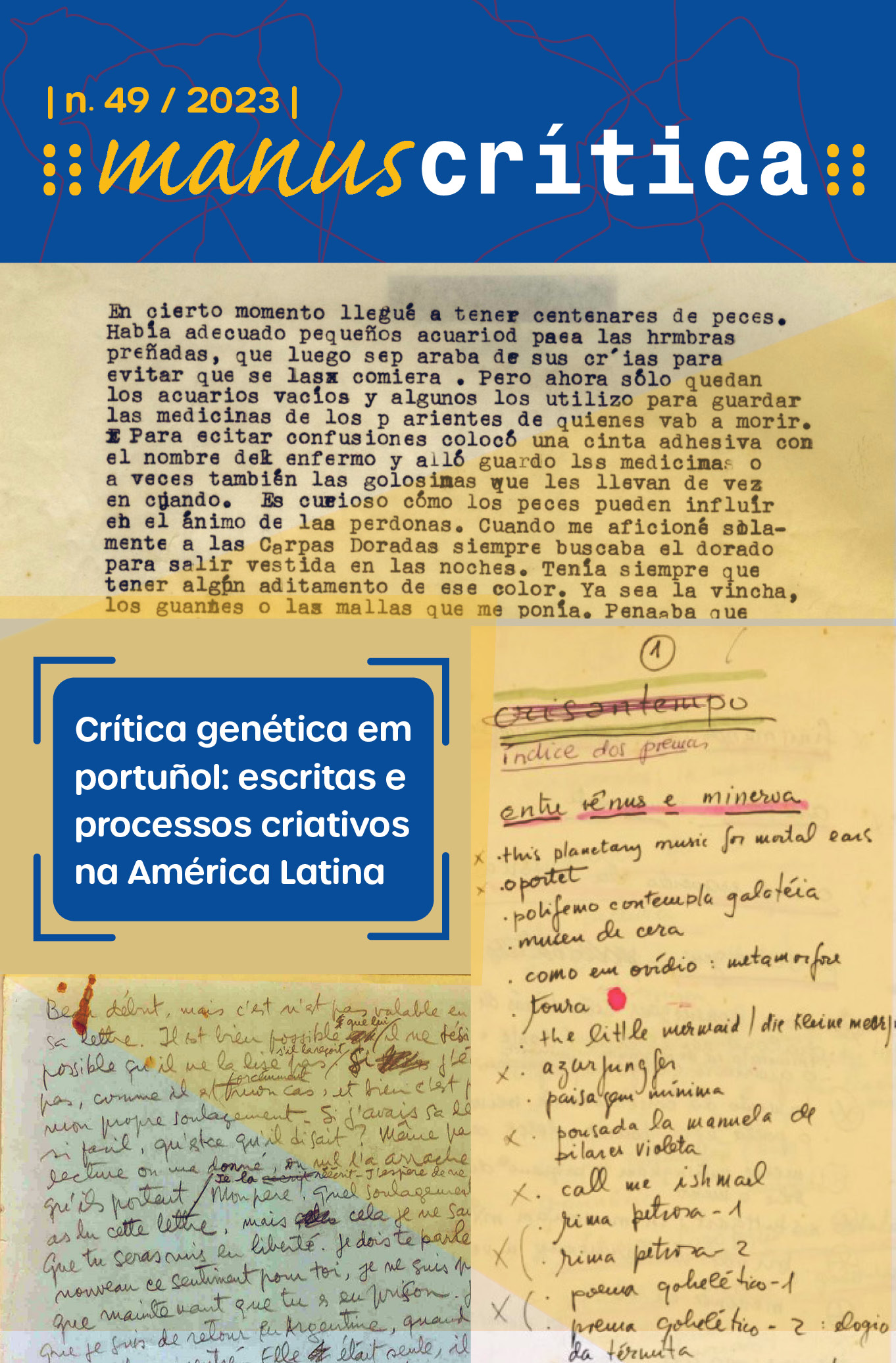Impacto da escritura sobre o escritor: o algoritmo, novo nome do estilo em formação no manuscrito
DOI:
https://doi.org/10.11606/issn.2596-2477.i49p193-206Palabras clave:
Neurociência, Inteligência artificial, Sloterdijk, Psicanálise, NietszcheResumen
Se escrever for considerado um exercício real próximo do atletismo, terá repercussões tanto no cérebro do escritor quanto em sua maneira de escrever. Num primeiro momento, lembrarei as observações dos neurocientistas Stanislas Dehaene (Les neurones de la lecture, 2007), Boris Cyrulnik (Des âmes et des saisons, 2020) e Yann Le Cun (Quand la machine apprend, 2019) sobre as mudanças nas áreas dos neurônios segundo as atividades de cada um. Assim como do escritor quando escreve e rascunha. Num segundo momento, salientarei a resistência física exemplar dos artistas e dos escritores, comparável com a de nossos melhores atletas, que exige treinamento prolongado e um certo ascetismo. Assim, segundo Peter Sloterdijk, tomando como ponto de partida o artista-acrobata de Zaratustra, o artista e o escritor substituem Deus e os reis nas respostas às grandes perguntas. No fim, será discutida a posição do filósofo alemão sobre a psicanálise, na qual segundo ele o homem não é mais dono de suas decisões. Contrariamente à teoria freudiana, Sloterdijk apoia a “subversão de cima” quando o artista e o escritor, apoiando-se nos arquivos (Foucault) que os antecederam, visam o “impossível” e o “multivirtuoso” para escalar a montanha do improvável (Le palais de cristal, À l’intérieur du capitalisme planétaire, 2015).
Descargas
Referencias
ALAVOINE, B. Quem conta a história em Simenon? Originalidade do jogo com voz e ponto de vista. Cahiers de narratologie, 10 de janeiro de 2001.
AUBERT, N. Proust et Bergson : La mémoire du corps. Revue de littérature comparée, 2011/2 (n°338), p. 133-149. https://www.cairn.info/revue-de-litterature-comparee-2011-2-page-133.htm
CYRULNIK, B. Des âmes et des saisons. Paris: Odile Jacob, 2020.
DAWKINS, R. A escalada do monte improvável. São Paulo, Companhia das Letras, 1998.
DEHAENE, S. Les neurones de la lecture. Paris: Odile Jacob, 2007.
DIAMANKA, S. Habitant de nulle part, originaire de partout. Paris: Points, 2021.
FOUCAULT, M. L’archéologie du savoir. Paris, Gallimard, 1969.
HANDKE, P. “Peter Handke 1/2, l’écriture, cette inconnue”. Disponível em https://www.radiofrance.fr/franceculture/podcasts/la-grande-table/peter-handke-1-2-l-ecriture-cette-inconnue-7558509, acesso em 2 de março de 2020.
JUNCKER, F. Entre sciences et lettres, le silence au fil des géométries (tese HDR). Nice, Universidade de Nice-Côte d’Azur, 2022.
LE CUN, Y. Quand la machine apprend. Paris : Odile Jacob, 2019
MAURO, F., Às margens do Vivonne, o estilo de Marcel Proust nos romances de Pedro Nava, Jorge Andrade e Cyro dos Anjos. São Paulo, FFLCH, 2022 (tese inédita).
NIETZSCHE, F. Ainsi parlait Zarathoustra. Paris: Gallimard, 1947.
PROUST, M. O tempo redescoberto. Tradução de Lúcia Miguel Pereira. São Paulo, Globo, 2013.
ROMAN: La méthode Simenon. csaintonge's Blog. Disponível em: https://csaintonge.wordpress.com/2013/03/16/roman-la-methode-simenon/. Acesso em 1º de julho de 2023.
SAPIRO, G. Peut-on dissocier l’œuvre de l’auteur ?. Paris: Seuil, 2022.
SARAMAGO, J. O autor como narrador. Revista Ler, n. 38, Primavera/ Verão de 1997.
SLOTERDIJK, P. Le palais de cristal, À l’intérieur du capitalisme planétaire. Paris, Pluriel, 2010.
SLOTERDIJK, P. Tu dois changer ta vie. Paris, Fayard, 2015
SOARES, M. Gênesis. São Paulo: Ed. Paulinas, 1955.
SÓFOCLES. Antigone. Tradução de Paul Mazon e Philippe Willemart. Paris: Gallimard, 1962,
SÓFOCLES. Antígona. Tradução de Donald Schüler, São Paulo, L&MP Pocket, 1999.
WILLEMART, P. A Escritura pela Rasura: A Crítica Genética em Busca de Outros Saberes. São Paulo: Perspectiva, 2022.
Descargas
Publicado
Número
Sección
Licencia
Derechos de autor 2023 Philippe Leon Marie Willemart

Esta obra está bajo una licencia internacional Creative Commons Atribución 4.0.













